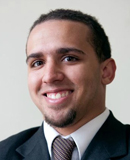February 17, 2015 — Wesley Lowery, Washington Post reporter, discussed his extensive coverage of Ferguson, Missouri, and its lessons for the media.
When Lowery arrived in Ferguson at the beginning of the protests, he had no idea what was to come. “I’m thinking I’ll drop into Missouri for a day, we’ll get a dateline in the paper tomorrow… I’ll write a feature for the weekend, I’ll be home by Saturday night,” he said. “Clearly, that wasn’t what happened. I essentially lived in Missouri from August 11 until December 11.”
Lowery said he approached his reporting with respect for the people who lived there, and their experiences. He wanted to avoid writing “the swooping piece about this place the reporter’s never been until yesterday.” Instead, Lowery decided to cover Ferguson “more like a metro reporter covering a city that I lived in,” having as many conversations with local people as possible, and writing as often as possible.
He posted photos and video to Twitter – ranging from individual residents to neighborhood buildings – to show a Ferguson beyond the violence that was aired repeatedly on television news.
Lowery soon learned that Ferguson erupted not only because of Mike Brown’s death – but because of a long-standing distrust of the police and local government. “It’s about so much more than the shooting,” he said. “It’s about a community of people saying this isn’t about one slight, or one thing…we finally hit this point where we’re deciding that our local government is illegitimate, that the social contract is broken, that this doesn’t work.”
Although it’s too early to know the full legacy of the events in Ferguson, Lowery said that lessons for media outlets are clear: They must engage people on the platforms they use, empower them to tell their own stories, and respond to people.
“If you don’t tackle these stories this way, you’re going to lose your relevance and that level of being essential,” said Lowery. “If the people of Ferguson don’t like your coverage – if they don’t think it’s fair, if they don’t think it’s nuanced, if they don’t think it’s real, if they don’t think you really understand them, they’re not going to click on it… they’re not going to share it, because they don’t have to anymore.”
Listen to the full audio recording above to hear Lowery discuss politics and policing in Ferguson, his career, and more.
Article and photo by Nilagia McCoy of the Shorenstein Center.


